News
Decoded: Virat Kohli the white-ball captain
 DECODED
DECODEDIs Kohli a great leader? Or do the numbers not actually tell the full story?
"Relief. I was glad it was over because the build-up for this tournament and everything that mentally, emotionally I had to deal with throughout the tournament in the last couple of weeks was just a lot. It was a lot to handle.”
No, these words were not spoken by Virat Kohli. It did, however, come from a man who is as intense an athlete and personality as the Indian skipper.
Indeed, this was Novak Djokovic’s response when he was asked to describe his emotions after he’d failed to complete the ‘Calendar Grand Slam’ at the US Open. Not pain. Not heartbreak. Not disappointment. ‘Relief’ was what Djokovic felt when everything came to an end.
It is entirely possible, therefore, that once the dust settles, once he is free of the burden of white-ball captaincy, Kohli too might feel the same way. Just relieved that everything is over.
He is already two-thirds there, having given up IPL and T20I captaincy, and if reports are to be believed, there is a good chance of him relinquishing ODI captaincy too by the end of the year. And if he does, you simply cannot blame him. This is a man who has been operating on overdrive for half a decade.
But let’s save the speculation for later.
On May 11, 2011, a certain 22-year-old from Delhi led a white-ball side at the highest level for the first time. 9 years and 273 games later, it is time to decode Virat Kohli the white-ball skipper.
The Numbers Game
Despite being someone who has endured the highest of highs and lowest of lows with all the sides he’s led, Kohli the RCB captain and Kohli the India captain are almost unrecognizable in the way they are perceived. And for good reason.
Under Kohli, India have been near-unstoppable in both ODIs and T20Is. More often than not, they’ve been the team to beat, and have been a side who opponents dread coming up against. Such has been the air of invincibility around the unit that it has, across the past five years, begun almost every single match as the favorite.
That has, however, not been the case with Royal Challengers Bangalore. But before going into detail about Kohli’s RCB struggles, it is worth exploring just how dominant India have been in limited-overs cricket, under his leadership.
India under Kohli: a behemoth in limited-overs cricket
Such has been India’s eminence in bilateral ODIs since Kohli took over that even calling them the ‘Kings of bilateral cricket’ would be an understatement. Since Kohli permanently took over ODI captaincy in 2017, India have played 17 bilateral series. Remarkably, they’ve won 13 of the 17, losing just 4 series across 5 years. At home they’ve been near unbeatable, losing a solitary series under Kohli (against Australia in 2019). They’ve displayed a level of consistency that is truly absurd.
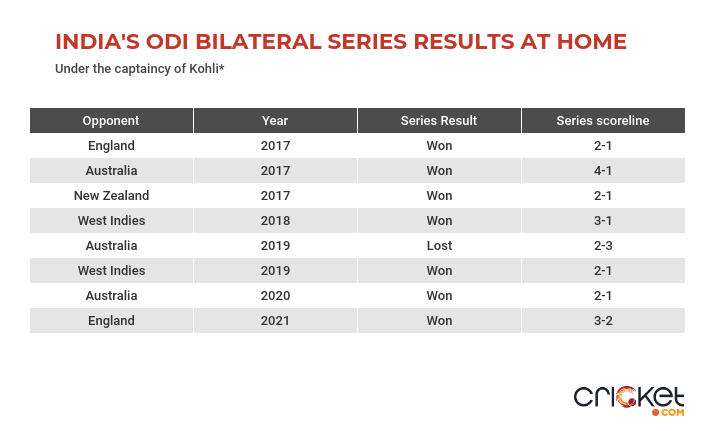
This dominance is reflected in Kohli’s overall record as ODI captain.
In 95 ODIs as skipper, Kohli has won 65 and lost just 27. In the history of ODI cricket, among those who have skippered their country 50 or more times, only three captains - Cronje, Ponting and Clive Lloyd - have a better W/L ratio.
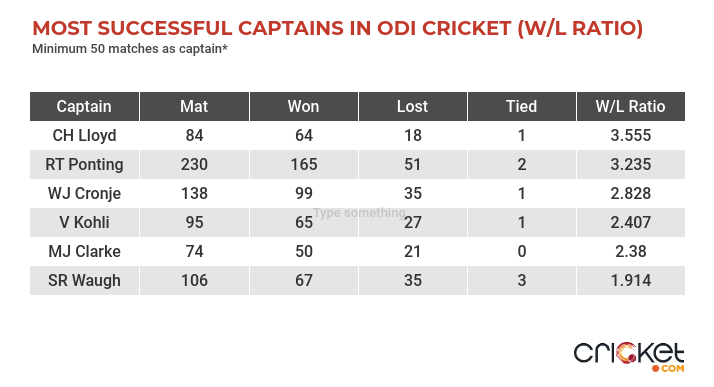
To give an even better perspective, Kohli’s India have lost just 28% of all the ODIs they’ve played. This figure stood at 37% for the country under Dhoni.
It would, of course, be fallacious and dishonest to talk about Kohli’s ODI captaincy without addressing the elephant in the room: the empty ICC Trophy cabinet. We will get to that later. But the numbers portray just how devastating India have been under Kohli in ODI cricket.
It is no different in T20Is. Kohli the T20I skipper has arguably been even better, and does not even have the blemish of failing at an ICC event.
He is statistically the fourth-most successful captain in the history of the format, and under him, India have lost a mere two series. No one in the history of T20I cricket boasts a better W/L ratio away from home than Kohli (2.400).
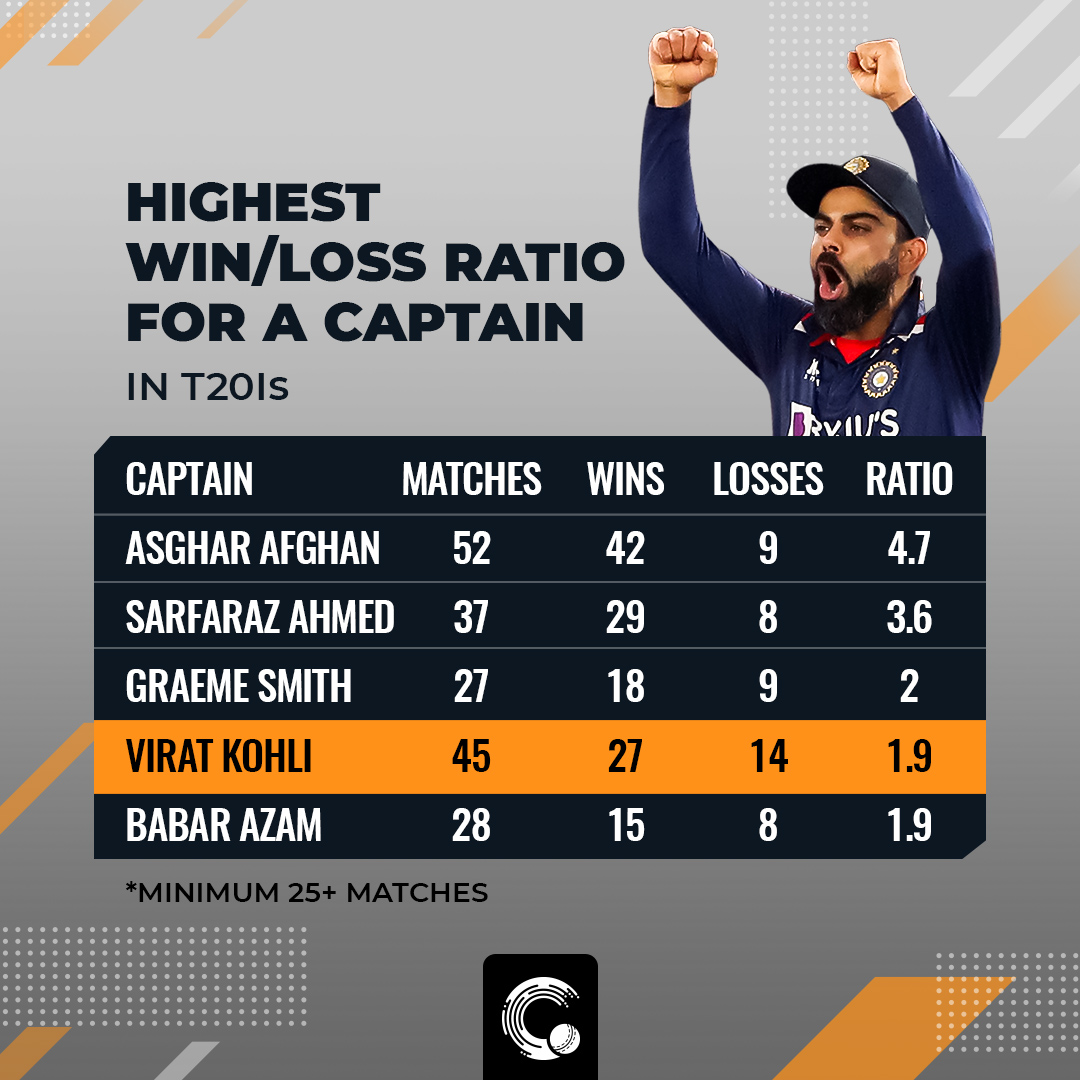
ALSO READ: Virat Kohli: An outstanding T20I skipper whose legacy rests on the T20 World Cup
What is often under-acknowledged - and this is something common to both ODIs and T20Is - is just how effortlessly authoritative India, under Kohli, have been away from home.
In T20I cricket, India have won a bilateral series in every country they’ve played. England is the only country they’ve not conquered in ODIs, and they came ever-so-close to doing so in 2018.
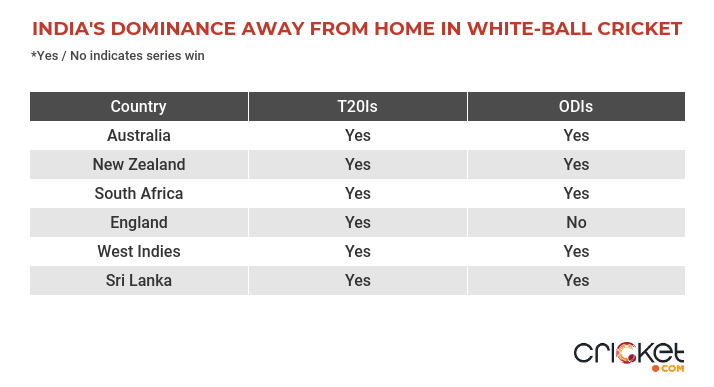
The upshot of this unrelenting consistency has meant that, for the good part of the last half a decade, India have held onto the Number one ranking in either format at some point each year, almost never dropping out of the top two.
RCB under Kohli: Perennial underachievers
A simple glance at Kohli’s record as RCB captain would make you wonder if he almost struck a deal with the devil - whether he sacrificed his IPL record just so he could be successful at the international level.
In all, Kohli, who was appointed permanent full-time skipper in 2013, has led RCB in 133 matches. Among those who have led a franchise in 50 or more matches - there are only nine players who have done so - only Adam Gilchrist has a lower win percentage. Gilchrist, however, has something Kohli, to date, does not: an IPL Trophy.
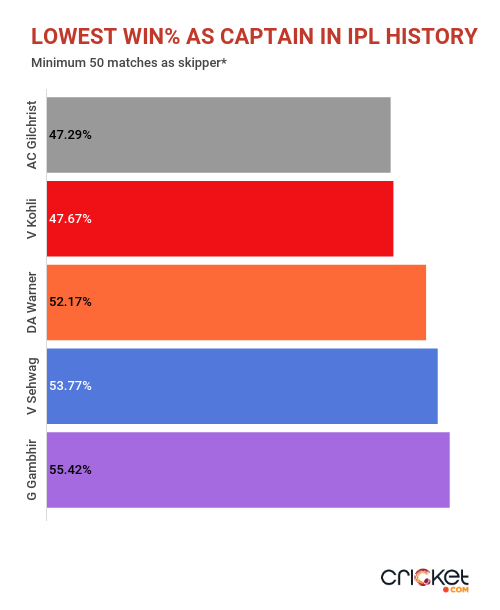
What’s been flabbergasting, however, is how consistently poor RCB under Kohli have been, despite boasting some of the all-time-greats in the line-up over the years.
Excluding 2021, in 8 full seasons under Kohli in the IPL, RCB have reached the playoffs just thrice. Unfathomably enough, they’ve finished bottom twice. One of those two seasons (2017) was immediately after they reached the final (2016), highlighting just how unstable and volatile the franchise has been under Kohli’s leadership.
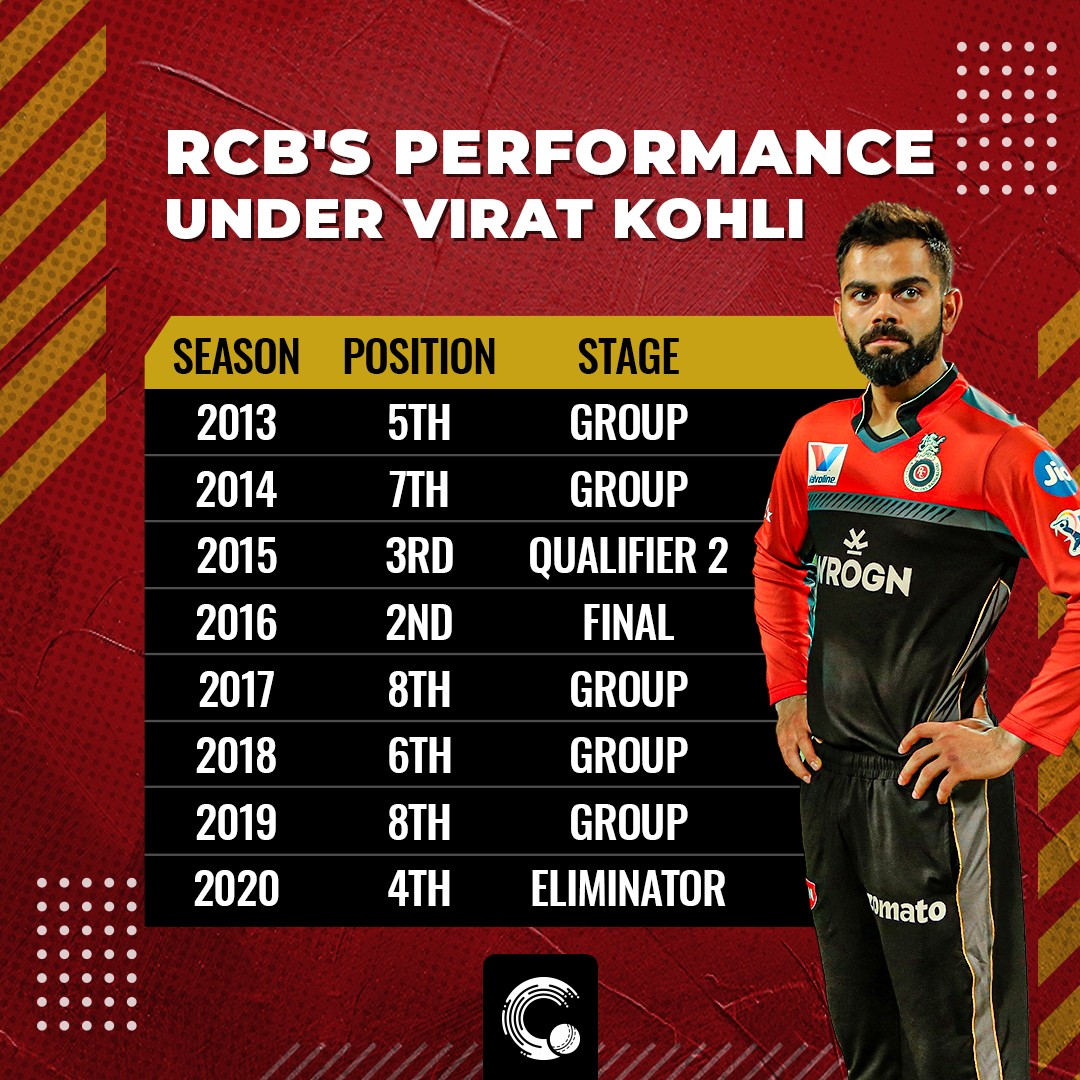
Contrasting Red and Blue fortunes
The contrast in Kohli’s results as captain for India and RCB are puzzling indeed. And the sample size in the IPL is far too big to just brush it off as an aberration.
But perhaps something that could explain this variability is the fact of Kohli not having ‘his side’ at RCB.
Kohli, since taking over as India captain, has had the final say on almost everything. The team we see today is the team he has built, and, to date, he continues to take all the shots.
By contrast, the dynamics of the IPL - which involves individuals getting chopped and changed every year and plenty of other staff taking decisions - has meant that Kohli has been provided a side and asked to lead it. Even should he envision building the side a certain way, the unpredictable nature of the auction means that disruption of plans is always on the cards.
That is certainly no excuse for eight years worth of underperformance, for the hallmark of a great captain is adaptability. But one does wonder how much instability in the franchise - with respect to personnel in both players and coaching staff - played a part in Kohli’s inability to churn out results on a consistent basis.
The Good and Bad of Kohli the white-ball skipper
The Good
Among all the good traits that Kohli the skipper possesses, something that trumps the rest is how he always leads by example. They say there is a stark difference between a ‘boss’ and a ‘leader’ and Kohli, during his time as captain, has been a true leader in the fullest sense.
Nothing illustrates this better than how he’s shouldered responsibility by taking his batting to superhuman levels once becoming captain - for all the teams he’s played.
But he’s led by example in more than one aspect. It is not just the runs, for Kohli has been at the forefront of a fitness revolution. He has set the bar so high that it has not only pushed players and teammates of the current generation to strive for improvement, but also inspired up-and-coming youngsters. This has, in turn, had a positive impact on both the bowling and fielding fronts.
What Kohli has also inculcated into the Indian side during his time at the helm is aggression and ruthlessness. ‘Clinical’ is often a term used to describe the Indian white-ball side over the past five years and a major reason for the same is their relentlessness. It is propelled by intensity, and the vigor comes directly from the skipper himself.
Lastly, Kohli, during his time as skipper, has also instilled infrangible self-belief within the unit. His teams play with a ‘champion’ mindset regardless of who they are up against, and expect and fully believe that they can win a particular match till the very last ball is bowled. It is no coincidence that the team has pulled off so many heists over the past half-a-decade.
The Bad
Arguably the biggest drawback of Virat Kohli the skipper in white-ball cricket is how reactionary he’s tended to be. Despite insisting that he is someone who believes in the ‘process’, several decisions he’s made, particularly in crucial moments, have been influenced by a single result or an event.
The biggest such occurrence came immediately after the drubbing at the hands of England in the 2019 World Cup. India spent two years grooming wrist-spinners Kuldeep Yadav and Yuzvendra Chahal, and their partnership proved integral to their domination of the one-day circuit across the 2017/18 and 2018/19 seasons.
Yet one bad game - they combinedly conceded 1/160 off their 20 overs - was all that was needed for Kohli to permanently break the duo and move on to Plan B. India also, after the England encounter, abruptly dropped Kedar Jadhav mid-way through the competition despite grooming the right-hander as a finisher for no less than three years.
The complete alienation of Navdeep Saini on the back of two bad matches versus Australia is a more recent example. Not too long ago, Saini was India’s primary enforcer in 50-over cricket, yet one bad series saw him discarded, with Prasidh Krishna taking his place.
Then there’s also been the occasional betrayal of trust, such as the omission of Ambati Rayudu from the 2019 World Cup squad. Kohli, months prior to the World Cup, had publicly backed Rayudu to be the No.4 for the side in the quadrennial event, yet the Andhra batsman saw himself not even make the cut for the final 15 despite playing all matches in lead-up to the competition. Rayudu’s non-selection - and India’s subsequent failure to field an able No.4 in the World Cup - would then go on to become the single biggest talking point.
Indecisiveness and impatience with tactics and selections have also been a hallmark of Kohli the skipper in the IPL, something that has, at times, hurt RCB.
Case in point the Eliminator against SRH last season. RCB, in that encounter, made as many as four personnel changes and also had a completely new opening partnership, with Kohli himself opening in the season for the first time. The decision eventually backfired as the Sunrisers marched to victory.
By his own admission, Kohli is someone who likes to trust his ‘instinct’, but on multiple occasions it has tended to work against the teams he has captained.
The unavoidable, inescapable ‘Trophy’ chat
“Dread it. Run from it. Destiny still arrives.” These words of Thanos, in many ways, are very much applicable to Kohli the captain, particularly in white-ball cricket.
No matter how many wins he registers, no matter how much his teams tend to dominate, there is one thing he simply will not be able to shy away from: the absence of a trophy.
It was 9 years ago that Kohli embarked on his journey as a white-ball captain, and yet in a dozen attempts, he’s had no trophy to show for his success.
Indeed, as his record shows, the Indian team in particular have been a force to be reckoned with. They’ve also consistently been the best team in the world for half-a-decade.
But when all is said and done, years down the line, it won’t be the bilateral records or win percentage that people will use to judge Kohli the captain. Likewise, it won’t be Kohli’s memorable partnerships with de Villiers that will put him in the pantheon of great IPL leaders.
Trophies, at the end of the day, are the only currency that matter. At least by the existing standards of how captains and teams are judged.
There is a reason why the West Indies side of the 70s and 80s and the Australia of 2000s are celebrated the way they are: they walked the talk and always came out on top when it mattered.
That has never been the case with Kohli’s teams, who have faltered and stumbled prior to the finish line, be it at ICC events or in the IPL.
And that, as it stands, is the only blemish in his CV. It is, however, a blot significant enough to leave a permanent stain on his legacy.
Which is precisely why these next 60 days most certainly will be career-defining for the legacy of Virat Kohli the white-ball captain.
Win both the IPL and the T20 World Cup and he will ensure that he not just signs off on a high, at least in the shortest format, but takes a giant step in being acknowledged as an all-time-great skipper, even in white-ball cricket. Lose and he will be remembered as the captain whose sides always wilted when it mattered.
How history will remember him only time will tell, but for Kohli the white-ball skipper, his destiny is currently in his own hands.